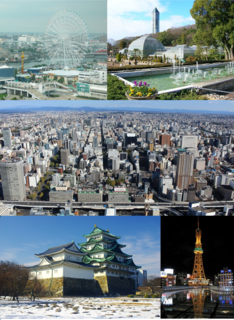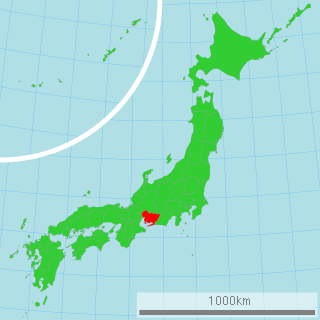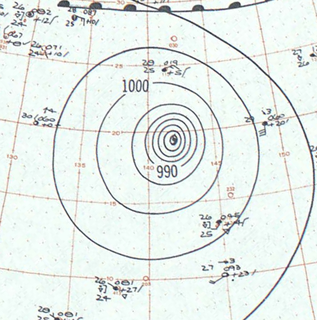
Jingū-mae Station is a railway station in Atsuta-ku, Nagoya, Japan, operated by the private railway operator Nagoya Railroad. It is the nearest station to Atsuta Shrine.

The Nagoya Municipal Subway is a rapid transit system serving Nagoya, the capital of Aichi Prefecture in Japan. It consists of six lines that cover 93.3 kilometers (58.0 mi) of route and serve 87 stations. Approximately 90% of the subway's total track length is underground.

The Meitetsu Nagoya Main Line or Nagoya Line is a railway line operated by the private railway operator Nagoya Railroad (Meitetsu), connecting Toyohashi Station in Toyohashi with Meitetsu Gifu Station in Gifu.

The Meitetsu Komaki Line is a 20.6 km (12.8 mi) railway line in Aichi Prefecture, Japan, operated by the private railway operator Nagoya Railroad (Meitetsu), connecting Kamiiida Station in Nagoya with Inuyama Station in Inuyama. The track from Kamiiida to Ajima is mostly underground, a continuation of the Kamiiida Line operated by the Nagoya Municipal Subway.

The Meitetsu Tokoname Line is a railway line in Aichi Prefecture, Japan, operated by the private railway operator Nagoya Railroad (Meitetsu), connecting Jingū-mae Station in Nagoya and Tokoname Station in Tokoname.

Motojuku Station is a railway station on the Meitetsu Nagoya Main Line located in Okazaki, Aichi, Japan. It is located 18.7 kilometers from the terminus of the Nagoya Main Line at Toyohashi. It provides access to the University of Human Environments and Hōzō Temple.

Meiden Yamanaka Station is a railway station on the Meitetsu Nagoya Main Line in Okazaki, Aichi, Japan. It is located 20.4 kilometers from the terminus of the Nagoya Main Line at Toyohashi.

Fujikawa Station is a railway station on the Meitetsu Nagoya Main Line located in Okazaki, Aichi, Japan. It is located 23.1 kilometers from the terminus of the Nagoya Main Line at Toyohashi.

Miai Station is a railway station on the Meitetsu Nagoya Main Line located in Okazaki, Aichi, Japan. It is located 25.6 kilometers from the terminus of the Nagoya Main Line at Toyohashi.

Otogawa Station is a railway station on the Meitetsu Nagoya Main Line located in Okazaki, Aichi, Japan. It is located 27.6 kilometers from the terminus of the Nagoya Main Line at Toyohashi.

Yahagibashi Station is a railway station on the Meitetsu Nagoya Main Line located in Okazaki, Aichi, Japan. It is located 32.5 kilometers from the terminus of the Nagoya Main Line at Toyohashi.

Shin Anjō Station is a railway station on the Meitetsu Nagoya Main Line in Anjō, Aichi, Japan, operated by the private railway operator Nagoya Railroad (Meitetsu).
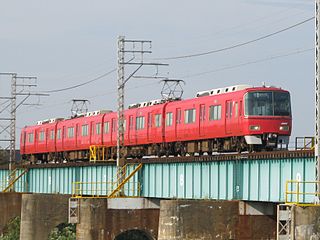
The Meitetsu Nishio Line is a railway line operated by the private railway operator Nagoya Railroad (Meitetsu) in Aichi Prefecture, Japan, connecting Shin Anjō and Kira Yoshida. It originally included a branch from Nishio-guchi to Okazaki-shin on the Tokaido Main Line, which closed in 1962.
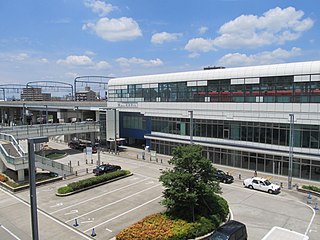
Narumi Station on the Meitetsu Nagoya Main Line locatedin Midori-ku, Nagoya, Japan. It is located 55.1 kilometers from the junction of the Nagoya Main Line at Toyohashi.

Horita Station is a railway station on the Meitetsu Nagoya Main Line located in Mizuho-ku, Nagoya, Japan. It is located 61.1 kilometers from the junction of the Nagoya Main Line at Toyohashi.

The Meitetsu Bisai Line is a 30.9 km Japanese railway line which connects Yatomi Station in Yatomi, Aichi with Tamanoi Station in Ichinomiya, Aichi. It is owned and operated by the private railway operator Nagoya Railroad (Meitetsu).

The Seto Line is a Japanese railway line which connects Sakaemachi Station in Higashi-ku, Nagoya, Aichi Prefecture with Owari Seto Station in Seto, Aichi. It is owned and operated by the private railway operator Nagoya Railroad (Meitetsu).
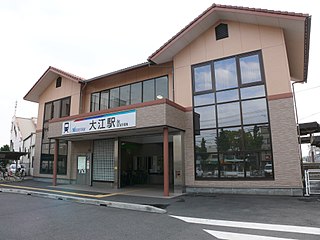
Ōe Station is a railway station operated by Meitetsu on the Tokoname Line and Chikkō Line located in Minami-ku, Nagoya, Aichi Prefecture, Japan.
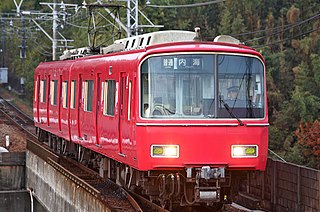
The Meitetsu Chita New Line or Chita Line is a Japanese railway line connecting Taketoyo with Minamichita within Aichi Prefecture. It is owned and operated by the private railway operator Nagoya Railroad (Meitetsu). The line features seven tunnels and a maximum grade of 3.4%.

Higashi Nagoyakō Station is a railway station on the Meitetsu Chikkō Line operated by the private railway operator operated by Nagoya Railroad (Meitetsu) in Minato-ku, Nagoya, Aichi Prefecture, Japan.
This article incorporates material from the corresponding article in the Japanese Wikipedia.
